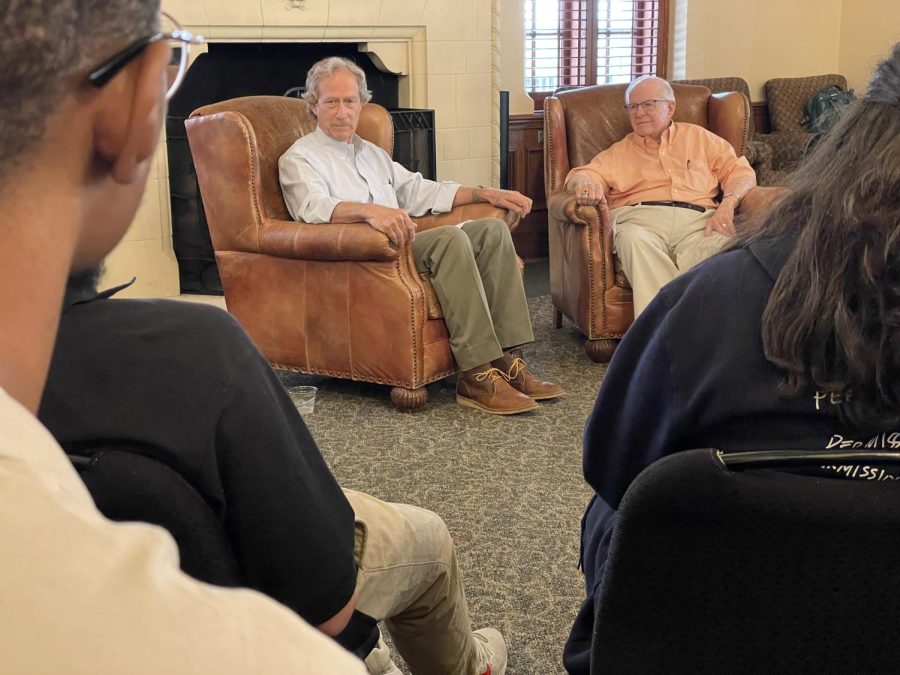WASHINGTON — Secretary of State John Kerry on Wednesday called National Security Agency leaker Edward Snowden a fugitive and challenged him to “man up and come back to the United States.”
Kerry was asked about Snowden in a nationally broadcast discussion in the wake of an interview in which Snowden said he never intended to be holed up in Russia but was forced to go there because his passport was revoked.
Snowden, a former NSA contract systems analyst, leaked a massive volume of NSA documents to the media.
“If Mr. Snowden wants to come back to the United States,” Kerry said, “we’ll have him on a flight today.” Kerry said Snowden should “stand up in the United States and make his case to the American people.”
In his interview with NBC anchor Brian Williams, a portion of which was broadcast Tuesday, Snowden said he was “trained as a spy” and argued that he had a much larger role in U.S. intelligence than the government has acknowledged.
“I was trained as a spy in sort of the traditional sense of the word, in that I lived and worked undercover overseas,” he said.
—Associated Press
National Security Adviser Susan Rice said in a CNN interview that Snowden never worked undercover.
Tainted chicken in Calif. still making people sick
WASHINGTON — An outbreak of antibiotic-resistant salmonella linked to a California chicken producer continues to sicken people more than a year after it started.
Despite the illnesses, producer Foster Farms has not initiated a recall, and the government has no apparent plans to shut it down.
The federal Centers for Disease Control said there were 50 new illnesses in the last two months, bringing to 574 the total number of cases in the outbreak. Most of the illnesses are in California.
Though centered on the West Coast, the outbreak is widespread — victims came from 27 states and Puerto Rico.
The Department of Agriculture said it is closely monitoring Foster Farms facilities and that measured rates of salmonella in the company’s products have been going down. The department threatened to shut down Foster Farms’ facilities last year but let them stay open after the company said it made immediate changes to reduce salmonella rates.
Food safety advocates say it is long past time to pressure the company for a recall and to shut down production.
“It’s very unclear why USDA isn’t taking more action to stop the sale of the product and protect the public,” said Caroline Smith DeWaal of the Center for Science in the Public Interest.
Foster Farms said this week that it has put new measures in place, including tighter screening of birds, improved safety on the farms where the birds are raised and better sanitation in its plants. The company suggested that the recent cases may be because salmonella incidents increase in the warmer months.
Dealing with outbreaks is nothing new for Foster Farms. The company was linked to salmonella illnesses in 2004 and then again in 2011, before the current outbreak, which started in 2013.
In a letter from USDA to Foster Farms last October, the department said inspectors had documented “fecal material on carcasses” along with “poor sanitary dressing practices, insanitary food contact surfaces, insanitary nonfood contact surfaces and direct product contamination.”
In January, USDA inspectors briefly closed a Foster Farms plant after finding cockroaches.
Recalls of poultry contaminated with salmonella are tricky because the law allows raw chicken to have a certain amount of salmonella — a rule that consumer advocates have long lobbied to change. Because salmonella is so prevalent in poultry and is killed if consumers cook it properly, the government has not declared it to be an “adulterant,” or illegal, in meat, as is E. coli. Outbreaks of salmonella in poultry can take longer to discover and recalls do not happen as quickly.
Because of those rules, USDA would likely have to go through the courts if it decided to force a recall.
The CDC said three-fourths of victims who were able to provide the agency with brand information said they had consumed chicken produced by Foster Farms before becoming ill.
The CDC said 37 percent of victims were hospitalized and 13 percent of the victims had developed blood infections, almost three times the normal rate.
The CDC’s Ian Williams said they are seeing a slow decline in the number of illnesses. “It suggests to us that they are starting to address the problem,” Williams said.
However, Williams said many more people have likely been sickened than are reported — the CDC routinely multiplies reported cases by 20 to 30, meaning up to 17,000 people could have been infected in the current outbreak.
USDA has not released a comprehensive list of where Foster Farms is sold. Last year, Costco and Kroger-owned stores took Foster Farms products off their shelves. Neither company responded to a request for comment on whether they are selling it again.
Foster Farms also did not respond to a request for comment on retail outlets.
Officials urge caution as tick season begins
OKLAHOMA CITY — State health officials and the Centers for Disease Control and Prevention on Wednesday urged Oklahoma residents to be vigilant about checking for ticks after the death of a man who acquired the Heartland virus.
Oklahoma’s health department has released few details about the death, noting only that the patient was a man over 65 from Delaware County in rural northeast Oklahoma. The man died from complications of the virus, which is found in the lone star tick and spread through tick bites.
The man is among 10 people known to have acquired the virus. The CDC has said another person died after acquiring the virus but had other health issues that may have factored into his death.
Little is known about the virus. Reported symptoms include fever, fatigue, headaches, muscle aches, appetite loss, nausea, bruising easily and diarrhea. There is no vaccine or drug to prevent or treat the illness.
In guidance for health care workers, the CDC said that, as of March, all human Heartland cases involved men age 50 or over. It said the men failed to respond to an antibiotic targeting ehrlichiosis, another tick-borne disease, but that with “supportive care” most fully recovered.
The exception, before the Oklahoma case, was an elderly man who suffered from other things that could have killed him, the CDC said.
Other cases of Heartland virus have been diagnosed in Missouri and Tennessee. Like previous cases, the Oklahoma victim had a history of outdoor activities and exposure, said Becky Coffman, an epidemiologist in acute disease with the Oklahoma health department.
Oklahoma is one of the main places in the U.S. where people acquire other tick-borne illnesses, such as Rocky Mountain spotted fever, said Justin Talley, a cooperative extension livestock entomologist.
“The biggest issue you need to be concerned is keeping ticks off you,” Talley said. “We have a lot of lone star ticks, and they’re always going to be around because of the wooded areas and the number of hosts.”
Only about one in 1,000 ticks is believed to be infected with any sort of pathogen, Talley said, but infection risks rise as people visit more tick-infested areas. The young and elderly have the highest risk of developing serious problems, he said.
Officials said residents should use insect repellent with at least 20 percent DEET, wear long-sleeved clothing and make thorough tick checks after being outside. To avoid ticks around the home, people can put gravel or woodchip barriers between their yard and wooded areas, avoid brush or leaf piles or tall grass and keep wildlife off their property.
Man gets life for tossing daughter into creek
FREEHOLD, N. J. — A man who tossed his 2-year-old daughter into a creek while she was strapped into her car seat apologized Wednesday — but not for murdering the child. Instead, just before he was sentenced to spend the rest of his life in prison, Arthur Morgan III apologized to the child’s mother for the breakdown of their relationship.
“I want to say I’m sorry for the deterioration of what I thought was a beautiful friendship between the two of us that blossomed into a daughter,” Morgan told Imani Benton. “For anybody that was truly affected by this, I hope we can all heal from this situation, knowing Tierra is in a better place.”
Given the chance to explain his actions to Superior Court Judge Anthony Mellaci Jr., Morgan complained that the media published photos that made him look inappropriately angry or happy, and said he would not have worn designer clothing to court if he knew he would be criticized for it. He also said his courtroom wink following his conviction was to reassure his sister he was not upset at the verdict.
Morgan was found guilty last month of murdering Tierra Morgan-Glover by tossing her into a creek, strapped into a car seat and weighed down by a tire jack, in November 2011.
The girl’s mother, who wore a dress embroidered with Tierra’s name and photos attached to it, said she hopes Morgan suffers in prison.
“I don’t understand why she was taken from me,” Benton said. “It does give me peace to know that she is in heaven with God, and (Morgan) will pay for what he did to her, to me and to everyone else. No good will come to him.”
Both the prosecutor and the judge lamented that New Jersey has abolished the death penalty.
“You’d be candidate No. 1 for its imposition,” Mellaci told Morgan. “Your actions were horrific, unthinkable and appalling.
“This child was alive when she was placed in the water in pitch darkness, and had to suffer the unthinkable action of having water rush in and fill her lungs while strapped into that car seat,” the judge said. “This child suffered before she died.”
Prosecutors alleged Morgan killed the girl because he was angry that Benton had broken off their relationship.
“It was because he wanted Imani and he couldn’t have her,” prosecutor Marc LeMieux said. “So he took away the one precious thing in her life.”
In court Wednesday, Morgan began to reassert allegations of abuse against Benton’s family that he made in a letter he sent her from jail, but the judge cut him off, directing him to speak about the act of killing his daughter. Mellaci said there was no evidence the girl was mistreated in any way before her death.
But in rambling comments that repeatedly sought to portray himself as a heroic figure wrongly maligned, Morgan asserted he was a good father.
“As a father, my job was to provide and protect,” he said. “All my actions prior to this were to make sure Tierra was safe and Imani was comfortable.”













